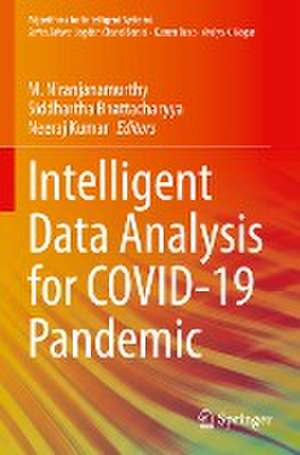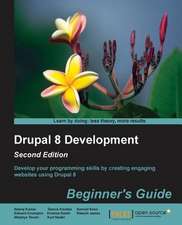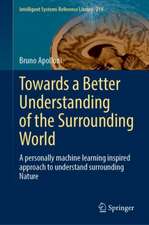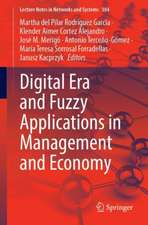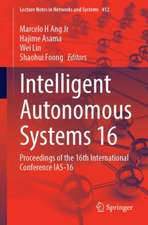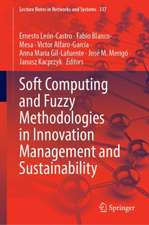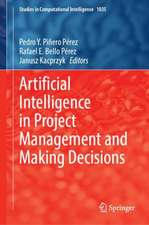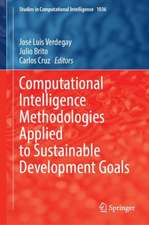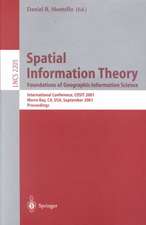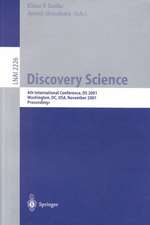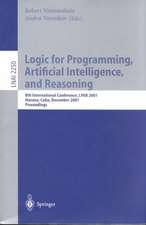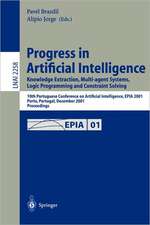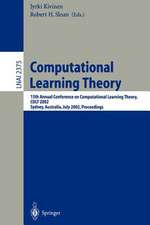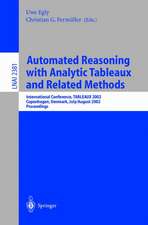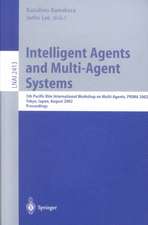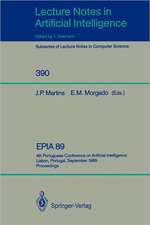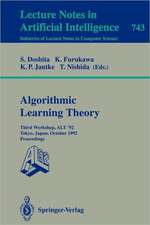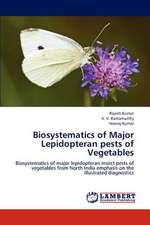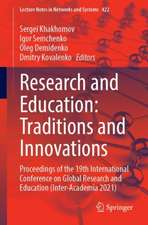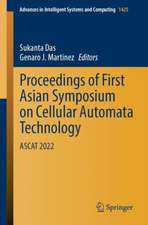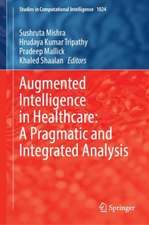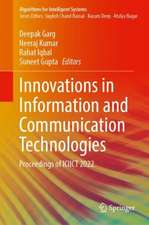Intelligent Data Analysis for COVID-19 Pandemic: Algorithms for Intelligent Systems
Editat de M. Niranjanamurthy, Siddhartha Bhattacharyya, Neeraj Kumaren Limba Engleză Paperback – 24 iun 2022
| Toate formatele și edițiile | Preț | Express |
|---|---|---|
| Paperback (1) | 1162.56 lei 6-8 săpt. | |
| Springer Nature Singapore – 24 iun 2022 | 1162.56 lei 6-8 săpt. | |
| Hardback (1) | 1168.81 lei 6-8 săpt. | |
| Springer Nature Singapore – 23 iun 2021 | 1168.81 lei 6-8 săpt. |
Din seria Algorithms for Intelligent Systems
- 20%
 Preț: 1761.30 lei
Preț: 1761.30 lei - 20%
 Preț: 760.79 lei
Preț: 760.79 lei - 20%
 Preț: 1166.52 lei
Preț: 1166.52 lei - 20%
 Preț: 1277.89 lei
Preț: 1277.89 lei - 18%
 Preț: 1214.09 lei
Preț: 1214.09 lei - 20%
 Preț: 1621.89 lei
Preț: 1621.89 lei - 20%
 Preț: 1461.86 lei
Preț: 1461.86 lei - 20%
 Preț: 1469.27 lei
Preț: 1469.27 lei - 18%
 Preț: 1567.67 lei
Preț: 1567.67 lei - 20%
 Preț: 1941.96 lei
Preț: 1941.96 lei - 20%
 Preț: 1753.06 lei
Preț: 1753.06 lei - 20%
 Preț: 1479.98 lei
Preț: 1479.98 lei - 20%
 Preț: 1158.26 lei
Preț: 1158.26 lei - 20%
 Preț: 1637.57 lei
Preț: 1637.57 lei - 20%
 Preț: 1767.09 lei
Preț: 1767.09 lei - 20%
 Preț: 1761.30 lei
Preț: 1761.30 lei - 20%
 Preț: 1296.04 lei
Preț: 1296.04 lei - 20%
 Preț: 1640.85 lei
Preț: 1640.85 lei - 20%
 Preț: 1936.18 lei
Preț: 1936.18 lei - 18%
 Preț: 1400.35 lei
Preț: 1400.35 lei - 20%
 Preț: 1948.56 lei
Preț: 1948.56 lei - 20%
 Preț: 1157.43 lei
Preț: 1157.43 lei - 18%
 Preț: 963.91 lei
Preț: 963.91 lei - 20%
 Preț: 1006.48 lei
Preț: 1006.48 lei - 20%
 Preț: 1473.39 lei
Preț: 1473.39 lei - 18%
 Preț: 1658.27 lei
Preț: 1658.27 lei - 20%
 Preț: 1163.21 lei
Preț: 1163.21 lei - 20%
 Preț: 1753.89 lei
Preț: 1753.89 lei - 20%
 Preț: 1275.42 lei
Preț: 1275.42 lei - 20%
 Preț: 1208.96 lei
Preț: 1208.96 lei - 20%
 Preț: 1169.47 lei
Preț: 1169.47 lei - 18%
 Preț: 1243.15 lei
Preț: 1243.15 lei - 20%
 Preț: 996.72 lei
Preț: 996.72 lei - 20%
 Preț: 1930.92 lei
Preț: 1930.92 lei - 20%
 Preț: 1287.12 lei
Preț: 1287.12 lei - 18%
 Preț: 1010.79 lei
Preț: 1010.79 lei - 20%
 Preț: 1162.37 lei
Preț: 1162.37 lei - 20%
 Preț: 1166.52 lei
Preț: 1166.52 lei - 20%
 Preț: 1296.69 lei
Preț: 1296.69 lei - 20%
 Preț: 1157.93 lei
Preț: 1157.93 lei - 20%
 Preț: 1766.58 lei
Preț: 1766.58 lei - 20%
 Preț: 1011.09 lei
Preț: 1011.09 lei - 20%
 Preț: 755.01 lei
Preț: 755.01 lei - 20%
 Preț: 1046.57 lei
Preț: 1046.57 lei - 20%
 Preț: 996.22 lei
Preț: 996.22 lei - 18%
 Preț: 943.25 lei
Preț: 943.25 lei - 20%
 Preț: 1283.96 lei
Preț: 1283.96 lei
Preț: 1162.56 lei
Preț vechi: 1453.20 lei
-20% Nou
Puncte Express: 1744
Preț estimativ în valută:
222.45€ • 232.26$ • 184.11£
222.45€ • 232.26$ • 184.11£
Carte tipărită la comandă
Livrare economică 04-18 aprilie
Preluare comenzi: 021 569.72.76
Specificații
ISBN-13: 9789811615764
ISBN-10: 9811615764
Ilustrații: XIX, 370 p. 156 illus., 105 illus. in color.
Dimensiuni: 155 x 235 mm
Greutate: 0.55 kg
Ediția:1st ed. 2021
Editura: Springer Nature Singapore
Colecția Springer
Seria Algorithms for Intelligent Systems
Locul publicării:Singapore, Singapore
ISBN-10: 9811615764
Ilustrații: XIX, 370 p. 156 illus., 105 illus. in color.
Dimensiuni: 155 x 235 mm
Greutate: 0.55 kg
Ediția:1st ed. 2021
Editura: Springer Nature Singapore
Colecția Springer
Seria Algorithms for Intelligent Systems
Locul publicării:Singapore, Singapore
Cuprins
Chapter 1. Machine Learning Based Ensemble Approach for Predicting the Mortality Risk of Covid-19 Patients: A Case Study.- Chapter 2. The Role of Internet of Health Things (IoHTs) & Innovative Internet of 5G Medical Robotic Things (IIo-5GMRTs) in COVID-19 Global Health Risk Management and Logistics Planning.- Chapter 3. Battling COVID-19 with Process Model of Integrated Digital Technology: An Analysis of Qualitative Data.- Chapter 4. High-fidelity intelligence ventilator to help infect with Covid-19 based on artificial intelligence.- Chapter 5. Boon of Artificial Intelligence in Diagnosis of Covid-19.- Chapter 6. Artificial Intelligence and Big Data Solutions for COVID-19.- Chapter 7. Modeling the Transmition Dynamics of COVID-19 Virus Disease in Nigeria.- Chapter 8. Emerging Trends in Higher Education during Pandemic Covid-19: An impact study From West Bengal.- Chapter 9. COVID-19: Virology, Epidemiology, Diagnostics and Predictive modelling.- Chapter 10. Improved Estimation inLogistic Regression through Quadratic Bootstrap Approach: An Application in Indian Agricultural e-learning System during COVID-19 Pandemic.- Chapter 11. COVID-19 and Stock Markets: Deaths and Strict Policies.- Chapter 12. Artificial Intelligence Techniques in Medical Imaging for Detection of Corona Virus (COVID-19 / SARS-COV-2): A Brief Survey.- Chapter 13. A Travelling Disinfection-man Problem (TDP) for COVID-19: A Nonlinear Binary Constrained Gaining-Sharing knowledge-based Optimization Algorithm.- Chapter 14. COVID-19 Lock down Impact on Mental Health: A Cross-sectional Online Survey from Kerala, India.- Chapter 15. Analysis, Modelling and Prediction of COVID-19 Outbreaks using Machine Learning Algorithms.
Recenzii
“Each article is self-contained with a detailed description of each method, background information, statistics and mathematical details, theory, and application. Anyone looking for inspiration could find several examples and use cases of available data that can be used for insight generation. … The strength of this edited book is that the readers would become familiar with several data sources and demonstration of intelligent analysis of data that social scientist routinely collect.” (Enayet Raheem, ISCB News, iscb.info, June, 2022)
Notă biografică
Dr. Niranjanamurthy M is Assistant Professor, Department of Computer Applications, M S Ramaiah Institute of Technology, Bangalore, Karnataka, India. He completed Ph.D. in Computer Science at JJTU, Rajasthan (2016); M.Phil. in Computer Science at VMU, Salem (2009); Masters in Computer Applications at Visvesvaraiah Technological University, Belgaum, Karnataka (2007); BCA from Kuvempu University 2004 with University 5th Rank. He has 10 years of teaching experience and 2 years of industry experience as Software Engineer. He has published books in Scholars Press Germany and CRC Press. He also published 56 research papers and filed 12 patents. Currently, he is guiding four Ph.D. research scholars in the areas of data science, edge computing, ML, and networking. He is Reviewer of 22 international journals and Series Editor in CRC Press and Scrivener Publishing. He has received best research journal reviewer and researcher awards. He is a member of IEEE, CSTA, IAENG, and INSC. His areas of interest are data science, ML, edge computing, software engineering, web services, cloud computing, and networking.
Dr. Siddhartha Bhattacharyya [LFOSI, LFISRD, FIET (UK), FIETE, FIE(I), SMIEEE, SMIETI, SMACM, LMCRSI, LMCSI, LMISTE, LMIUPRAI, LMCEGR, LMICCI, LMALI, MIRSS, MIAENG, MCSTA, MIAASSE, MIDES, MISSIP, MSDIWC] is currently serving as Professor in the Department of Computer Science and Engineering of Christ University, Bangalore. He is Co-Author of 5 books and Co-Editor of 75 books and has more than 300 research publications in international journals and conference proceedings to his credit. He has got two PCTs to his credit. He is Associate Editor of several reputed journals including Applied Soft Computing, IEEE Access, Evolutionary Intelligence, and IET Quantum Communications. He is Editor of International Journal of Pattern Recognition Research and Founding Editor-in-Chief of International Journal of Hybrid Intelligence, Inderscience.His research interests include hybrid intelligence, pattern recognition, multimedia data processing, social networks, and quantum computing.
Dr. Neeraj Kumar is currently engaged with the Department of Information Technology, Babasaheb Bhimrao Ambedkar University (A Central University), Lucknow (India). He has completed his Doctorate in Information Technology from BBAU, Lucknow, in March 2020. He has completed his basic education from Government Polytechnic, Budaun, and then graduation and PG from UPTU, Lucknow, and IIIT Allahabad in the year 2005 and 2010, respectively. After graduation, he was appointed as Lecturer in BSACET, Mathura, while after PG, appointed as Assistant Professor in various institutes of RTU and UPTU. He has published more than two dozen research articles in reputed international journals and conferences. He has published few patents related to computer science and disaster management. He has published few authored and edited books withthe publishers of national repute. He has research interests in topics related to real-life problem, including disaster management, IoT, big data, soft computing, cyber security, and quantum cryptography.
Dr. Siddhartha Bhattacharyya [LFOSI, LFISRD, FIET (UK), FIETE, FIE(I), SMIEEE, SMIETI, SMACM, LMCRSI, LMCSI, LMISTE, LMIUPRAI, LMCEGR, LMICCI, LMALI, MIRSS, MIAENG, MCSTA, MIAASSE, MIDES, MISSIP, MSDIWC] is currently serving as Professor in the Department of Computer Science and Engineering of Christ University, Bangalore. He is Co-Author of 5 books and Co-Editor of 75 books and has more than 300 research publications in international journals and conference proceedings to his credit. He has got two PCTs to his credit. He is Associate Editor of several reputed journals including Applied Soft Computing, IEEE Access, Evolutionary Intelligence, and IET Quantum Communications. He is Editor of International Journal of Pattern Recognition Research and Founding Editor-in-Chief of International Journal of Hybrid Intelligence, Inderscience.His research interests include hybrid intelligence, pattern recognition, multimedia data processing, social networks, and quantum computing.
Dr. Neeraj Kumar is currently engaged with the Department of Information Technology, Babasaheb Bhimrao Ambedkar University (A Central University), Lucknow (India). He has completed his Doctorate in Information Technology from BBAU, Lucknow, in March 2020. He has completed his basic education from Government Polytechnic, Budaun, and then graduation and PG from UPTU, Lucknow, and IIIT Allahabad in the year 2005 and 2010, respectively. After graduation, he was appointed as Lecturer in BSACET, Mathura, while after PG, appointed as Assistant Professor in various institutes of RTU and UPTU. He has published more than two dozen research articles in reputed international journals and conferences. He has published few patents related to computer science and disaster management. He has published few authored and edited books withthe publishers of national repute. He has research interests in topics related to real-life problem, including disaster management, IoT, big data, soft computing, cyber security, and quantum cryptography.
Textul de pe ultima copertă
This book presents intelligent data analysis as a tool to fight against COVID-19 pandemic. The intelligent data analysis includes machine learning, natural language processing, and computer vision applications to teach computers to use big data-based models for pattern recognition, explanation, and prediction. These functions are discussed in detail in the book to recognize (diagnose), predict, and explain (treat) COVID-19 infections, and help manage socio-economic impacts. It also discusses primary warnings and alerts; tracking and prediction; data dashboards; diagnosis and prognosis; treatments and cures; and social control by the use of intelligent data analysis. It provides analysis reports, solutions using real-time data, and solution through web applications details.
Caracteristici
Presents intelligent data analysis in dealing with COVID-19 outbreak Discusses data analysis methods and tools for analyzing COVID-19 symptoms Serves as a reference resource for researchers and academicians
